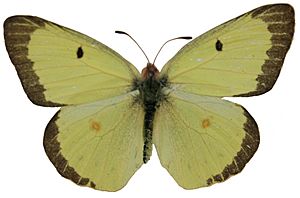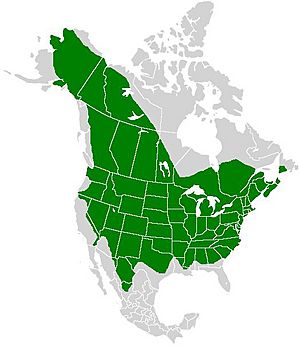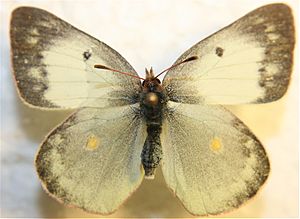Common sulphur facts for kids
Quick facts for kids Common sulphur |
|
|---|---|
 |
|
| Male specimen | |
| Conservation status | |
| Scientific classification |
|
| Kingdom: | Animalia |
| Phylum: | Arthropoda |
| Class: | Insecta |
| Order: | Lepidoptera |
| Family: | Pieridae |
| Genus: | Colias |
| Species: |
C. philodice
|
| Binomial name | |
| Colias philodice Godart, 1819
|
|
 |
|
| Script error: The function "autoWithCaption" does not exist. | |
Script error: No such module "Check for conflicting parameters".
The Clouded Sulphur (Colias philodice) is a common North American butterfly. It is also called the common sulphur. This butterfly belongs to the Pieridae family. You can find them in many open areas.
Contents
What They Look Like
Clouded Sulphur butterflies usually have pale yellow wings. Both male and female butterflies are typically yellow. They do not have orange colors on their wings. This is different from their close relative, the orange sulphur.
Male Clouded Sulphurs have clear, dark borders on their wings. Females have yellow dots inside these dark borders. Sometimes, female butterflies can be white instead of yellow. This is called the alba form.
The underside of the male's wings is yellow. Female undersides can be yellow or greenish-white. Both sexes have a double spot on their hindwings. This spot is outlined in brownish-red. They also have four small red spots along the outer edge of their hindwings. This helps tell them apart from other similar butterflies. Their wings can spread from about 32 to 54 millimeters wide.
The white alba form can be very common in some places. In other areas, it is rare. It can be tricky to tell the white Clouded Sulphur apart from white forms of other Colias butterflies. The orange sulphur also has a white form. You can often tell them apart by looking at the wing border patterns. However, some individual butterflies are very hard to identify without seeing other normal ones nearby. White Colias butterflies might also be confused with other white butterflies. These include the Cabbage White and the Checkered White.
White males of this species are very rare.
Where They Live
You can find Clouded Sulphur butterflies in many open places. They like fields, lawns, and meadows. You might also see them in alfalfa or clover fields. They are often found along roadsides too. Sometimes, many of these butterflies gather together at mud puddles. They drink water and minerals from the wet ground.
These butterflies live across most of North America. They are not found in Labrador, Nunavut, or northern Quebec. Clouded Sulphurs migrate every year. This means they fly to different places depending on the season.
What They Eat (Nectar Plants)
Adult Clouded Sulphur butterflies drink nectar from many different flowers. They use their long tongues to sip the sweet liquid. Some of their favorite flowers include:
- Milkweed (Asclepias species)
- Butterfly bush (Buddleja species)
- Coneflower (Dracopis, Echinacea, and Rudbeckia)
- Alfalfa (Medicago sativa)
- Dandelion (Taraxacum species)
- Clover (Trifolium species)
- Tall verbena (Verbena bonariensis)
They visit many other types of flowers too.
Where They Lay Eggs (Host Plants)
Female Clouded Sulphurs lay their eggs on specific plants. These are called host plants. The caterpillars will eat these plants when they hatch. Some common host plants are:
- Ground-plum (Astragalus crassicarpus)
- Platte River milk-vetch (Astragalus plattensis)
- Soybean (Glycine max)
- Deer vetch (Lotus species)
- Alfalfa (Medicago sativa)
- White sweet clover (Melilotus albus)
- Black locust (Robinia pseudoacacia)
- White clover (Trifolium repens)
- Red clover (Trifolium pratense)
- Vetch (Vicia species)
Life Cycle
The life of a Clouded Sulphur butterfly starts as a tiny egg. The eggs are pale yellow. They are laid one by one on a host plant. After a few days, the eggs turn red. Just before they hatch, they turn gray.
When the egg hatches, a small larva (caterpillar) comes out. The caterpillar is green. It has a white stripe along each side of its body. These white stripes might have pink or orange lines within them. The caterpillar eats and grows.
After growing enough, the caterpillar changes into a chrysalis. This is the pupa stage. The chrysalis is green. It hangs upright from a silken thread. Just before the butterfly is ready to come out, the chrysalis turns yellow. It also gets a pink "zipper" mark. Then, the adult butterfly emerges!
Gallery
-
Male nectaring on red clover
Similar Butterflies
It can be easy to confuse the Clouded Sulphur with other butterflies. Here are some similar species:
- Colias eurytheme – the orange sulphur
- Colias interior – the pink-edged sulphur








